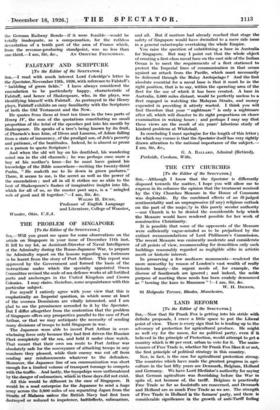FALSTAFF AND SCRIPTURE
[To the Editor of the Sencrsroa.] Sin,—I read with much interest Lord Coleridge's letter in the Spectator, November 13th, 1926, with reference to Falstaff's babbling of green fields." I have always considered the emendation to be particularly happy, characteristic of Falstaff, and hence of Shakespeare, who, in the plays, was identifying himself with Falstaff. As portrayed in the Henry plays, Falstaff exhibits an easy familiarity with the Scriptures of both the Old Testament and the New.
He quotes from them at least ten times in the two parts of Henry IV, the sum of the quotations constituting no small proportion of the total of the speeches put into his mouth by Shakespeare. He speaks of a tree's being known by its fruit, of Pharaoh's lean kine, of Dives and Lazarus, of Adam falling from a state of innocency, of the prodi„oal son, of Job's poverty and patience, of the beatitudes. Indeed, he is almost as prone as a parson to quote Scripture!
And when the old wit lay on his deathbed, his wandering mind ran in the old channels ; he was perhaps once more a boy at his mother's knee—for he must have gained his knowledge of the Bible somewhere—reciting the twenty-third Psalm, " He maketh me to lie down in green pastures." There, it seems to me, is the secret as well as the power of the emendation ; and all in all it strikes me as akin to the best of Shakespeare's flashes of imaginative insight into life, which for all of us, as the master poet says, is a " mingled web of good and ill together."—I am, Sir, &c.
WALDO H. Dubai, Professor of English Language and Literature, College of Wooster.
Wooster, Ohio, U.S.A.










































 Previous page
Previous page